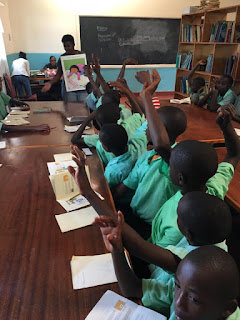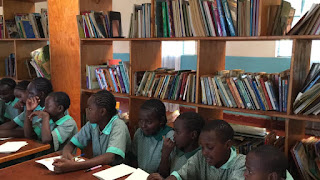EVERY time we teach on leadership to our children aged between 12-16 years old , we always ask, a key question. THE question will always be, What does your name say about you? in most cases, since we know our children's names, we have often called out one or two and almost always with a similar result. There will either be clapping or there will be giggling and whispering with an indication in a certain direction.
A good name is better than gold or silver goes a wise saying. Have we taught our children that their names matter? When you walk into any community, what will your name be saying about you? Will it give you the confidence to stand before a crowd or will you want to run and hide? What values do you want them to have? as a young person what values will your name be associated with?
To lead others you must lead yourself first. This is very fundamental. Because the fact is, you are teh captain of your own ship. How will others respond to you if you cannot take interest in yourself first?
 HERE are a few highlights of our lesson
HERE are a few highlights of our lesson
1.Good children have good habits. Habits are behaviors you do
repeatedly. They are how you show your character every day. Your habits can
produce very good results or not. As you become more better, your good
behaviors also grow and develop and you are able to work well with others for
example your teachers, other students, your friends etc (quoted from the 7 habits work book)
2.
Core values are at the heart of every decision you make,
every opinion you develop. They’re an expression of what you believe, and they
provide the foundation for your reaction to everything that happens in your
lifetime. What do you believe? Maybe you believe that you are smart, your
parents love you, you are a good person, and you are generous. Or you might
believe bad things about yourself. I
need you to identify your beliefs and let them guide you through life.
Remember, they belong to you and you
and then we proceeded to give them a story that is quite universal in its nature but has very important lessons.
A little steam engine had a long train of cars to pull.
She went along very well until she came to a steep hill. But
then, no matter how hard she tried, she could not move the long train of cars.
She pulled and she pulled. She puffed and she puffed. She
backed and started off again. Choo! Choo!
But no! The cars
would not go up the hill.
At last she left the train and started up the track
alone. Do you think she had stopped
working? No, indeed! She was going for
help.
“Surely, I can find someone to help me, “ she thought.
Over the hill and up the track went the little steam engine.
Choo! Choo! Choo! Choo! Choo! Choo!
Pretty soon she saw a big steam engine standing on a side
track.
He looked very big and strong. Running alongside, she looked
up and said:
“Will you help me over the hill with my train of cars? It is
so long and heavy I can't get it over.”
The big steam engine looked down at the little steam
engine. Then he said:
“Don't you see that I am through my day's work? I have been
rubbed and scoured ready for my next run.
No, I cannot help you.”
The little steam engine was sorry, but she went on, Choo,
choo!
Choo, choo! Choo, choo!
Soon she came to a
second big steam engine standing on a
side track. He was
puffing and puffing, as if he were tired.
“That big steam engine may help me, “thought the little
steam engine. She ran alongside and asked:
“Will you help me bring my train of cars over the hill? It is so long and heavy that I can't get over.”
The second big steam engine answered: “I have just come in
from a long, long run. Don't you see how
tired I am? Can't you get some other
engine to help you this time?”
“I'll try, “ said the little steam engine, and off she
went. Choo, choo! Choo, choo!
Choo, choo!
After awhile she came to a little steam engine just like
herself. She ran alongside and said:
“Will you help me over the hill with my train of cars? It is so long and so heavy that I can't get
it over.”
“Yes, indeed!” said this little steam engine. “I'll be glad to help you if I can.”
So the little steam engines started back to where the train
of cars had been standing. Both little
steam engines went to the head of the train , one behind the other.
Puff, puff! Chug, choo! Off they started!
Slowly the cars began to move. Slowly they climbed the steep
hill. As they climbed, each little steam
engine began to sing:
“I-think-I-can! I-think-I-can! I-think-I-can! I-think-I-can!
I-think-I-can!I-think-I-can! I-think-I-can!I-think-I-can! I-think-I-can!!
And they did! Very soon they were over the hill and going
down the other side.

Now they were on the plain again; and the little steam
engine could pull her train herself.
So
she thanked the little engine who had come to help her, and said good-by.
And she went merrily on her way, singing:
“I thought-I-could! I thought-I-could! I thought-I-could! I
thought-I-could! I thought-I-could! I thought-I-could! I thought-I-could! I
thought-I-could! I thought-I-could! I thought-I-could! I thought-I-could!--”
We are of the opinion that if a child is taught to think they can , if they can change their mental attitude then they can achieve alot of what they think is impossible. The question however remains, will they? What as parents can we do to help ?
 - preview the book :
- preview the book : - ask yourself is the text makes sense
- ask yourself is the text makes sense



